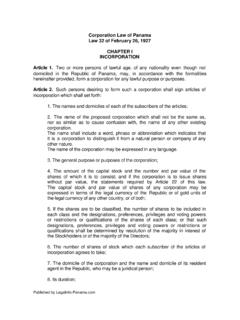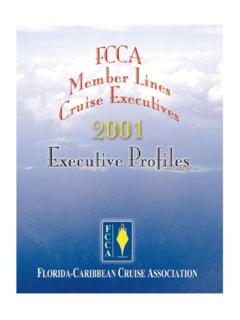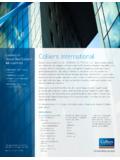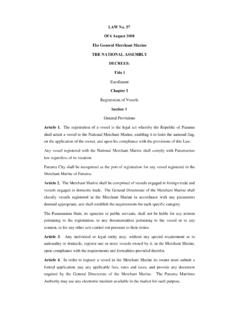Transcription of Tax Law Confidential: Attorney-Client Privilege and …
1 Tax Law confidential : Attorney-Client Privilege and the Work Product Doctrine in Tax Practice Adam J. Smith1 OVERVIEW I. Attorney-Client Privilege II. TAX PRACTITIONER-CLIENT Privilege III. WORK PRODUCT DOCTRINE IV. LIMITATIONS ON AND EXCEPTIONS TO Privilege a. Waiver of Attorney-Client Privilege and the common interest exception b. Crime-Fraud Exception c. Return preparation exception d. The Kovel Doctrine V. PROCEDURE AND BURDENS OF PROOF VI. RECENT CASES AND NOTEWORTHY DEVELOPMENTS a. Schaeffler v. United States, 806 34 (2d Cir.)
2 2015). b. United States v. Sanmina Corp. & Subsidiaries, No. 5:15-CV-00092-PSG, 2015 WL 2412322, at *1 ( Cal. May 20, 2015). c. In re Grand Jury Subpoenas Dated Mar. 2, 2015, 628 F. App'x 13, 13 (2d. Cir. 2015) (underlying case is United States v. Zukerman, S1 16 Cr. 194 (AT)). d. The Panama Papers 1 Adam J. Smith is the Visiting Assistant Professor of Tax at the University of Florida Levin College of Law and a Fellow of the Florida Bar Tax Section. Mr. Smith teaches Individual Income Tax, Corporate Tax, and Tax Research.
3 He continues to advise clients and co-counsel attorneys in tax controversy and tax planning matters. Mr. Smith holds a and an in Taxation from the University of Florida, and Bachelor s and Master s degrees in accounting from the University of Illinois at Urbana-Champaign. Before joining the UF Law faculty, Mr. Smith worked at the Office of Chief Counsel in Jacksonville, Florida, where he represented the Commissioner in various Tax Court proceedings and advised the on diverse procedural and substantive tax. Mr.
4 Smith is also a , with more than four years of public accounting experience in both audit and tax. 2 OUTLINE I. Attorney-Client Privilege a. Generally The Attorney-Client Privilege is a rule of evidence and discovery that protects from discovery and admissibility confidential communications between the client and the attorney . Fed. R. Evid. 501; Fed. P. 26(b)(1). The attorney client Privilege is the oldest of the privileges for confidential communications known to the common law. Upjohn Co. v. United States, 449 383, 389, 101 S.
5 Ct. 677, 682, 66 L. Ed. 2d 584 (1981)(citing 8 J. Wigmore, Evidence 2290 (McNaughton rev. 1961). b. Distinguished from duty of confidentiality The Attorney-Client Privilege is separate and distinct from an attorney s ethical duty of confidentiality. The duty of confidentiality is a rule of professional conduct that generally prohibits an attorney from revealing, without the client s informed consent, information relating to representation of that client. Model Rules of Prof l Conduct R. ; Fl. St. Bar R. c.)
6 Governing law For questions of Privilege in federal tax cases, federal common law applies. In re Albert Lindley Lee Memorial Hospital, 209 122 (2d Cir. 1953), cert. denied, 347 960 (1954). State law applies to questions of Privilege in cases involving state tax issues ( state sales and use tax). See, , PacifiCorp v. Dep't of Revenue of State of Mont., 838 914, 919 (Mont. 1992). Though not adopted by Congress, courts recognize as a source of general guidance regarding federal common law principles the rule the Supreme Court promulgated as part of the Proposed Federal Rules of Evidence.
7 In re Grand Jury Investigation, 399 527, 532 (2d. Cir. 2005); Fed. R. Evid. 501. 3 Proposed Rule 503 states: A client has a Privilege to refuse to disclose and to prevent any other person from disclosing confidential communications made for the purpose of facilitating the rendition of professional legal services to the client, (1) between himself or his representative and his lawyer or his lawyer s representative, or (2) between his lawyer and the lawyer s representative, or (3) by him or his lawyer to a lawyer representing another in a matter of common interest, or (4)
8 Between representatives of the client or between the client and a representative of the client, or (5) between lawyers representing the client. Prop. Fed. R. Evid. 503(b).2 For the purpose of applying Proposed FRE 503: o (1) A client is a person, public officer, or corporation, association, or other organization or entity, either public or private, who is rendered professional legal services by a lawyer, or who consults a lawyer with a view to obtaining professional legal services from him. o (2) A lawyer is a person authorized, or reasonably believed by the client to be authorized, to practice law in any state or nation.
9 2 Courts have invoked various iterations of the rule. For example, in United Shoe Machine Corp., the court stated : [T]he Privilege applies only if (1) the asserted holder of the Privilege is or sought to become a client; (2) the person to whom the communication was made (a) is a member of the bar of a court, or his subordinate and (b) in connection with this communication is acting as a lawyer; (3) the communication relates to a fact of which the attorney was informed (a) by his client (b) without the presence of strangers (c) for the purpose of securing primarily either (i) an opinion on law or (ii) legal services or (iii) assistance in some legal proceeding and not (d) for the purpose of committing a crime or tort; and (4) the Privilege has been (a) claimed and (b) not waived by the client.
10 United States v. United Shoe Machine Corp., 89 F. Supp. 357 (D. Mass 1950). 4 o (3) A representative of the lawyer is one employed to assist the lawyer in the rendition of professional legal services. o (4) A communication is confidential if not intended to be disclosed to third persons other than those to whom disclosure is in furtherance of the rendition of professional legal services to the client or those reasonably necessary for the transmission of the communication. Prop. Fed. R. Evid. 503(a). Summary of the Elements of attorney Client Privilege o (1) A communication o (2) Made between privileged persons o (3) In confidence o (4) For the purpose of obtaining or providing legal assistance.






